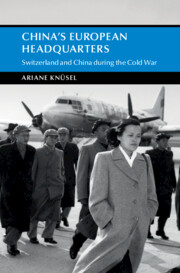Book contents
- China’s European Headquarters
- Cambridge Studies in the History of the People’s Republic of China
- China’s European Headquarters
- Copyright page
- Dedication
- Contents
- Figures
- Acknowledgements
- Note on the Text
- Abbreviations
- Introduction
- 1 Creating a European Hub
- 2 Becoming a Global Hub
- 3 ‘A Sick Man Shaken by Fits of Madness’
- 4 Dr No in Switzerland
- 5 Conclusion
- Bibliography
- Index
2 - Becoming a Global Hub
The Sino-Soviet Split, the Great Leap Forward, and Tibetan Refugees (1958–1965)
Published online by Cambridge University Press: 21 April 2022
- China’s European Headquarters
- Cambridge Studies in the History of the People’s Republic of China
- China’s European Headquarters
- Copyright page
- Dedication
- Contents
- Figures
- Acknowledgements
- Note on the Text
- Abbreviations
- Introduction
- 1 Creating a European Hub
- 2 Becoming a Global Hub
- 3 ‘A Sick Man Shaken by Fits of Madness’
- 4 Dr No in Switzerland
- 5 Conclusion
- Bibliography
- Index
Summary
China’s use of Switzerland changed as a result of the Sino-Soviet split, as China tried to compensate for the loss of assistance from the Soviet Union and its allies by increasing its relations with Western Europe. The Swiss missions in Switzerland were important for China’s efforts to increase its presence in Latin America and Africa in the late 1950s and early 1960s. The case of nine Chinese who were arrested in Brazil in 1964 is used to demonstrate how China’s missions in Switzerland contributed to China’s global presence, and how the Swiss government and Swiss businesses were affected by Chinese actions abroad. Swiss support for Tibet and Tibetan refugees is discussed to show that the Swiss government also took advantage of the importance that Switzerland played for China, and managed to get away with actions that China did not tolerate from other nations. The chapter also discusses the effects that the Great Leap Forward had on Chinese and Swiss bilateral trade relations from 1958 to 1965, how Swiss companies and government officials tried to increase trade, and how the Sino-Soviet split led China to increase the scope of its network of embargo goods dealers that it operated out of Bern.
Keywords
- Type
- Chapter
- Information
- China's European HeadquartersSwitzerland and China during the Cold War, pp. 83 - 143Publisher: Cambridge University PressPrint publication year: 2022

